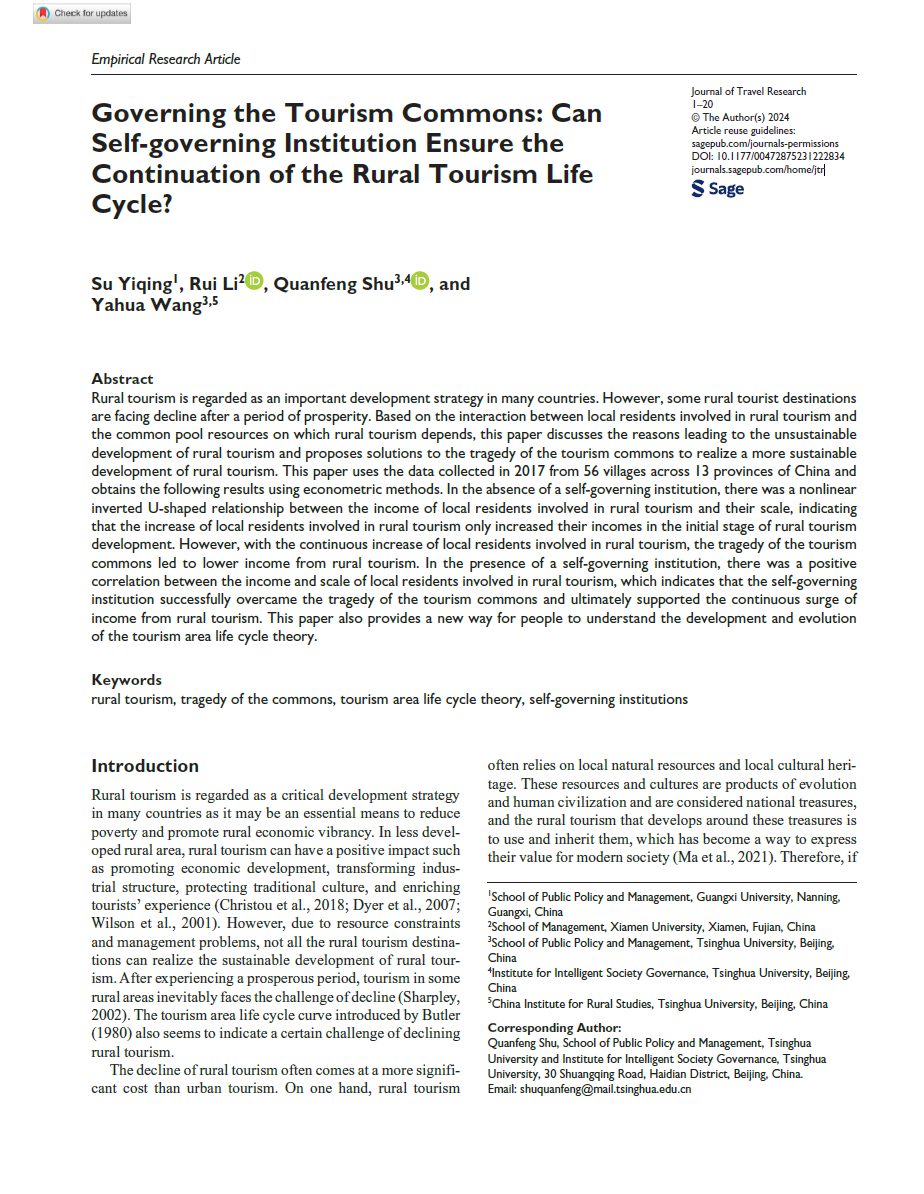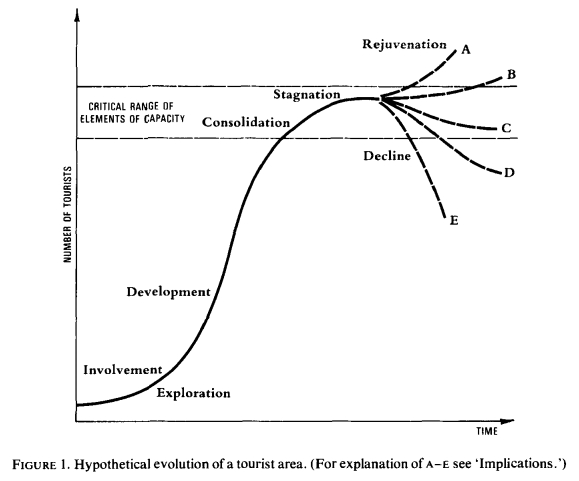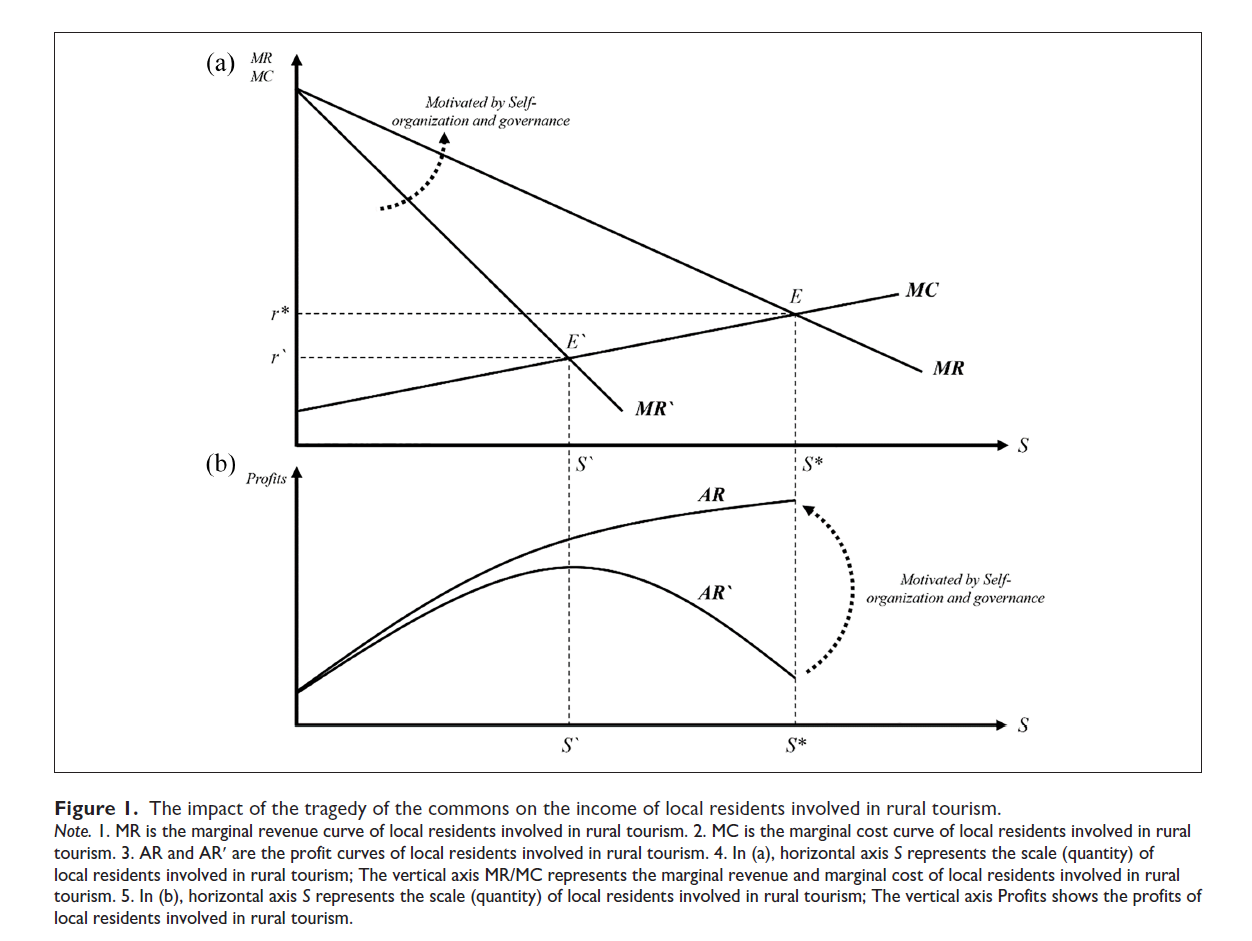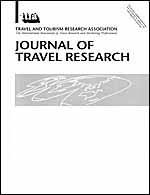Profile of the Authors:
Su Yiqing: Associate Professor, School of Public Policy and Management, Guangxi University
Li Rui: PhD Candidate, School of Public Administration, Xiamen University
Shu Quanpeng: Corresponding Author, Research Assistant, Institute for Smart Society Governance, Tsinghua University
Wang Yahua: Professor, Vice Dean, School of Public Policy and Administration, Tsinghua University, and Executive Director of China Rural Research Institute
Journal
Journal of Travel Research
Citation
Yiqing, S., Li, R., Shu, Q., & Wang, Y. (2024). Governing the Tourism Commons: Can Self-governing Institutions Ensure the Continuation of the Rural Tourism Life Cycle? Journal of Travel Research, 0(0). https://doi.org/10.1177/00472875231222834
Original Article Link
https://journals.sagepub.com/doi/10.1177/00472875231222834

Rural tourism is recognized as a vital tool for poverty reduction and a crucial pathway for rural economic development. It brings numerous benefits to rural areas, including job opportunities, economic growth, industry transformation, cultural preservation, and enhanced visitor experiences. However, due to resource constraints and governance challenges, not all rural tourism destinations achieve sustainable development. Many face decline after an initial period of prosperity. The decline of rural tourism can lead to the loss of natural resources, regional culture, and economic and social employment issues. Exploring ways to break the cycle of tourism destination life cycles and achieve sustainable development is crucial for developing countries with vast rural areas and large rural populations, as well as for the evolution and preservation of natural ecosystems and human civilization.
Recently, a study by Su Yiqing, Associate Professor at Guangxi University School of Public Policy and Management; Li Rui, a Ph.D. candidate at Xiamen University School of Management; Shu Quanpeng, Assistant Research Fellow at Tsinghua University's Institute for Smart Social Governance; and Wang Yahua, Professor at Tsinghua University's School of Public Policy and Management and Executive Director of the China Rural Research Institute, has been published in the internationally renowned journal Journal of Travel Research (SSCI-indexed, 2023 IF = 8.9). The paper, titled 、Governing the Tourism Commons: Can Self-governing Institutions Ensure the Continuation of the Rural Tourism Life Cycle? employs a Social-Ecological System (SES) framework and uses survey data from 56 rural tourism villages across 13 provinces in China to empirically examine the impact and mechanisms of self-governing institutions on mitigating the tragedy of the commons and extending the life cycle of tourism destinations.

The study employed OLS regression and IV-OLS regression methods for empirical analysis. The research found that in the absence of self-governing institutions, there exists an inverted U-shaped relationship between the scale of rural tourism operators and rural tourism income. On one hand, an increase in rural tourism operators can lead to an increase in total tourism revenue for the sample villages. On the other hand, as the number of rural tourism operators continues to grow, the issue of the tragedy of the tourism commons becomes more pronounced. The paper uses indicators such as water user associations, village councils, and the frequency of villagers' participation in public affairs to represent self-governing institutions. Further analysis revealed that when institutional rules are introduced, the significant inverted U-shaped relationship between the scale of rural tourism operators and village tourism income transforms into a significant positive linear relationship. This indicates that context-specific self-governing institutions can overcome the tragedy of the commons in rural tourism, ensuring continuous growth in tourism revenue and the sustainable development of the tourism industry.

The key to how self-governing institutions can promote the sustainable development of rural tourism lies in two main aspects. Firstly, effective self-governing institutions may facilitate cooperation among tourism operators, thereby developing new and more effective ways to exploit the resources of the tourism commons, such as expanding the capacity of the commons or diversifying tourism products. Secondly, self-governing institutions themselves can innovate and evolve, introducing new frameworks that adjust the existing interest connections and distribution methods among tourism operators. This adjustment promotes the more efficient development and utilization of tourism commons resources, thus extending the rural tourism life cycle and achieving sustainable development.
The analysis in this paper offers a new mechanism for understanding the evolution of the rural tourism area's life cycle from an institutional perspective. If the tragedy of the tourism commons at a particular stage can be resolved through self-governing institutions, the tourism area completes one stage of evolution and enters the next. Conversely, if the tragedy of the commons cannot be resolved at a given stage, the life cycle of rural tourism will decline and face termination. This research provides a new analytical perspective and theoretical explanation for understanding the evolution of the tourism life cycle and the logic of sustainable development.
This published work was supported by the National Social Science Fund of China (22GBL225 & 22CGL041).
- Journal Overview -

The Journal of Travel Research (JTR) is a leading international academic journal in the field of tourism. With a 2023 impact factor of 8.9, it is ranked as a Q1 journal in the Journal Citation Reports (JCR) and holds a four-star rating in the Association of Business Schools (ABS) Academic Journal Guide. JTR is dedicated to publishing cutting-edge research on various topics, including tourist consumer behavior, tourism marketing, tourism economics, and destination management.

